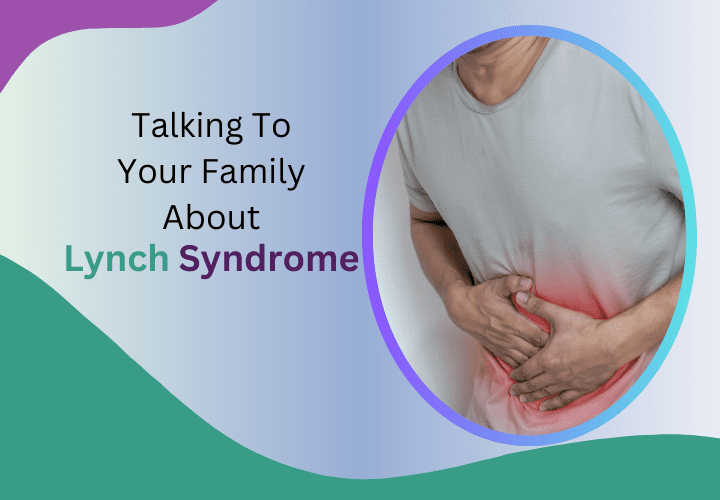Talking To Your Family About Lynch Syndrome

Talking To Your Family About Lynch Syndrome
- onco
- November 9, 2023
It can be challenging to talk about cancer and genetic risk in a family, and it’s expected to hear worries about worrying relatives and feeling guilty about passing on a hereditary problem. Within the context of genetic disorders, Lynch syndrome is a word that comes up a lot. It’s a diagnosis that frequently raises many questions and anxieties among people. However, talking to your family about Lynch syndrome is a crucial element of the disorder that is nearly as vital as knowing about it. We’ll talk about the value of having family discussions about Lynch syndrome and Lynch Syndrome treatment in this blog post, along with some advice on how to approach the subject.
What Is Lynch Syndrome?
Let’s define Lynch syndrome first before getting into the specifics of talking about it with your family. Hereditary Non-Polyposis Colorectal Cancer (HNPCC), sometimes referred to as Lynch syndrome, is a congenital disorder that raises the risk of several cancers, including endometrial and colorectal cancer. Genetic alterations that hinder the body’s capacity to mend damaged DNA are the root cause of it. Lynch syndrome sufferers consequently have a markedly increased chance of getting some cancers at an earlier age.
Value of communication in the family:
Here, we will discuss the importance of communication in the family about Lynch syndrome:
- Sharing genetic risk: Lynch syndrome is an autosomal dominant disorder, meaning that each kid of a family member with the syndrome has a 50% chance of inheriting the faulty gene. You can assist in identifying other family members who may be at risk and help them take preventive action by having a family discussion about Lynch syndrome.
- Early detection: Lynch syndrome management depends on early detection. People who are at risk require ongoing screening and monitoring. By discussing Lynch syndrome with your family, you might possibly persuade them to get tested and screened for the disease, which could allow them to catch it early and treat it more successfully.
- Support on an emotional level: Receiving a Lynch syndrome diagnosis can be emotionally taxing. Emotional support can be obtained by talking to your family about your hopes, anxieties, and experiences. Recall that your family can be a priceless source of support during your journey, and you are not alone.
Getting Started in the Conversation:
Of course, talking to your family about Lynch syndrome is a delicate subject. Here, we will discuss the following advice that will assist you in approaching these discussions:
- Select the appropriate time: Determine a moment when everyone is at ease and unoccupied. You have to establish a quiet, private area where everyone can talk freely without feeling pressed for time.
- Educate yourself: Become knowledgeable about Lynch syndrome, including its risk factors and inheritance patterns. This will assist you in responding to any inquiries from your family.
- Start discussion with the facts: Start off the discussion with some basic information regarding Lynch syndrome. Describe the condition, how it’s inherited, and the dangers involved.
- Tell about your experience: If you have received a Lynch syndrome diagnosis, tell us about it. Describe the effects it has had on your life and the reasons you think the family should talk about it.
- Engage in active listening: Invite your family members to share their ideas, worries, and questions. A supportive environment can be created by actively and sympathetically listening.
- Offer resources: Make an offer to give them dependable sources and data so they can investigate Lynch syndrome more on their own.
Possible Responses:
Be ready for a range of responses when you discuss Lynch syndrome with your family members. While some family members can be recalcitrant or in denial, others might be understanding and eager to learn. Here, we will discuss how to respond to various reactions:
- Family members who are supporting: You can encourage your proactive and supporting family members to get tested and join support organizations. They might encourage one another in the family and work together to raise awareness.
- Resistant family Members: Show patience and tolerance toward people who are reluctant to talk about Lynch syndrome. It may take some time for them to get the information, or you can maintain contact and offer to respond to inquiries later.
- Making informed decisions: In the end, these discussions aim to provide your family members with the knowledge and assistance they need to make wise health-related decisions. Even if their decisions are different from yours, respect them.
So, if you feel any symptoms or suffering with Lynch syndrome, the first step in treating it is to have a discussion with your family. Or you may build a network of support that not only helps family members to make wise decisions but also offers emotional solace by exchanging knowledge, insights, and feelings. You must recall that your family may be your greatest ally in overcoming Lynch syndrome together, and you are not alone on this road. Maintaining the well-being of your loved ones requires open and honest communication. After the discussion, if you want to consult a hospital for the best treatment for your cancer, then you should consult Oncoplus, the best oncology hospital in Delhi, India. At Oncoplus, a network of specialized cancer care facilities provides excellent cancer treatments with state-of-the-art technologies. Our compassionate team of cancer specialists is aware of the pains endured by those battling the disease, so we work hard every day to ensure that our patients have a positive experience. Since we firmly think that the environment can significantly aid a quick recovery.
Recent Posts
-
Pap Smear Screening for Cervical Cancer: Everything You Need to Know
February 26, 2025
-
How Air Pollution Increases the Risk of Lung Cancer: A Growing Concern
February 18, 2025





Leave a Reply